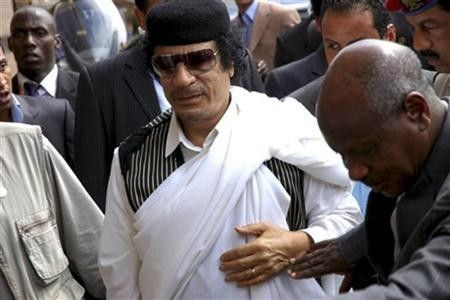Gaddafi supporters rally amid reports of unrest

Hundreds of supporters of Libyan leader Muammar Gaddafi rallied on Thursday but there were reports of unrest in several locations as the opposition called for a day of anti-government protests.
Gaddafi opponents communicating anonymously online or working in exile had urged people to protest on Thursday to try to emulate popular uprisings which unseated long-serving rulers in neighbouring Tunisia and Egypt.
In the capital of the oil exporting country there was no sign of any demonstrations, a Reuters reporter said, apart from the pro-Gaddafi demonstrators in the city's Green Square chanting We are defending Gaddafi! and waving his portrait.
But a resident of the eastern city of Benghazi told Reuters there were clashes on Thursday in the nearby town of Al Bayda between government supporters and relatives of two young men killed during a protest a day earlier.
After the burial of the two men, fighting started, the man, who said he had spoken to people in Al Bayda and did not want to be named, told Reuters.
Libya's Quryna newspaper had earlier reported that the regional security chief was removed from his post over the deaths of the two young men.
Al Bayda is not far from Benghazi, Libya's second city, where protesters clashed with police and Gaddafi supporters on Tuesday night. The resident in the city told Reuters: Benghazi is quiet.
New York-based Human Rights Watch said Libyan authorities had detained 14 activists and writers who had been preparing the anti-government protests, while telephone lines to parts of the country were out or order.
Snatches of information were trickling out from parts of the country on an Arabic-language Facebook page used by opposition activists, but the sources were not clear and it was not possible to verify the details.
BUILDING ON FIRE
One post said that protesters in Ar Rajban, near the border with Algeria, set fire to a local government headquarters. In Zenten, south-west of Tripoli, protesters shouted We will win or die, said another post, which also had a photograph of a building on fire.
However, there was calm in Libya's capital. On Omar al-Mokhtar street, Tripoli's main thoroughfare, traffic was moving as normal, banks and shops were open and there was no increased security presence.
The official Jana news agency reported that there were also rallies in support of Gaddafi in other cities.
Though some Libyans complain about unemployment, inequality and limits on political freedoms, analysts say an Egypt-style revolt is unlikely because the government can use oil revenues to smooth over most social problems.
Libya has been tightly controlled for over 40 years by Gaddafi -- who is now Africa's longest-serving leader -- and has immense oil wealth but the country has nevertheless felt the ripples from the uprisings in neighbouring states.
We have problems, Mustafa Fetouri, a Tripoli-based political analyst and university professor, told Reuters. This is a society that is still behind in many ways, there are certain legitimate problems that have to be sorted out.
But he said: I do not really see it (unrest) spreading... Gaddafi remains well respected and if there is any kind of measure of his popularity I am sure he would come out with a majority.
Libya bans all political parties, public dissent is rarely tolerated and over his time in office, rights groups say, thousands of Gaddafi's opponents have been put in prison.
But Gaddafi and his supporters say Libya is a democracy because of his system of direct rule through grass-roots institutions called popular committees.
Opposition activists designated Thursday as a day of protests because it is the anniversary of clashes on February 17, 2006 in Benghazi when security forces killed several protesters who were attacking the city's Italian consulate.
Human Rights Watch said Libya should free everyone detained for their role in anti-government protests.
With people from Tunisia and Egypt to Bahrain and Iran asserting their right to protest, the Libyan government is responding in exactly the wrong way, it said in a statement.
Libya accounts for about 2 percent of the world's crude exports. Companies including Shell, BP and Eni have invested billions of dollars in tapping its oil fields, home to the largest proven reserves in Africa.
© Copyright Thomson Reuters 2024. All rights reserved.




















